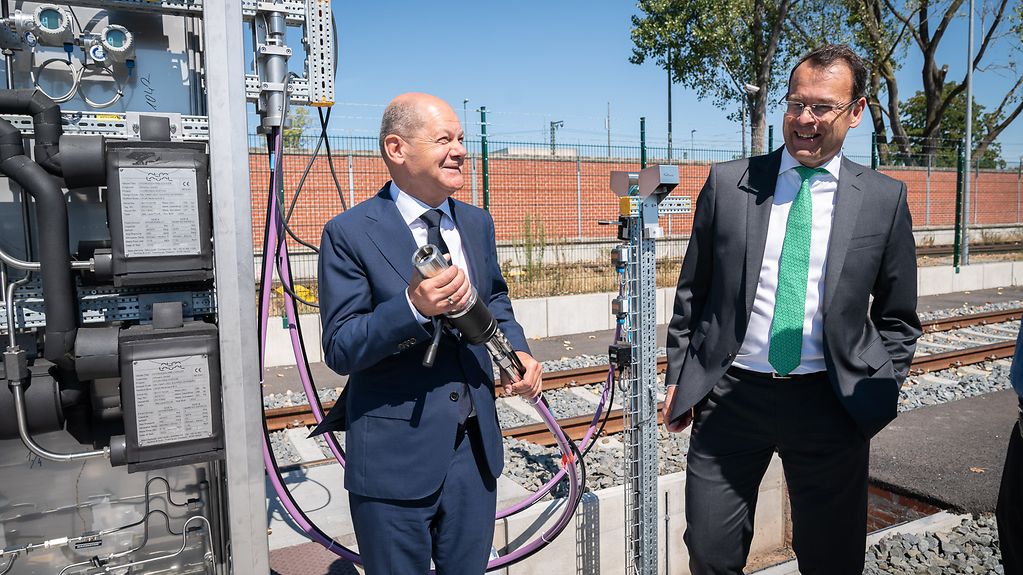Energy source of the future: hydrogen
Federal Chancellor Scholz visited Industriepark Höchst to learn about various hydrogen projects. The Federal Government is promoting the use of hydrogen to reduce Germany's dependence on fossil fuels for its energy supply.
3 Min. Lesedauer

Federal Chancellor Olaf Scholz testing a hydrogen fuelling station for fuel cell trains, while Managing Director Joachim Kreysing explains how it works.
Foto: Federal Government/Kugler
Hydrogen, a flexible and easily transportable energy carrier, is expected to replace natural gas, oil, and coal in the future. When produced by means of renewable energies, it is also environmentally friendly and is referred to as green hydrogen. Its use and production are CO2-neutral.
A number of companies are researching and producing these future technologies at Industriepark Höchst in Frankfurt am Main, which is one of Germany's largest industrial parks. Ineratec, for example, is developing a planned power-to-liquid plant there, which converts electricity into liquid energy media.
Hydrogen fuelling station for trains
Federal Chancellor Olaf Scholz visited the first hydrogen fuelling station for passenger trains in Hesse this Tuesday: by the end of 2022, it is expected to supply hydrogen for the world's largest fuel cell train fleet, which is operated by the Rhein-Main-Verkehrsverbund. Hydrogen is clearly set to play a key role in Germany's energy supply.
As the Federal Chancellor stressed: "We are currently experiencing a period of major industrial transformation. The German economy will one day produce and use energy in a very different way than it has done in the past, which means that we need renewable energy sources to produce a lot of electricity. But that also means using hydrogen."
Securing an independent energy supply
As an energy source, he said, hydrogen can be used for a wide variety of mobility applications, but also in the production sector. "At the same time,” said Scholz, “what we're learning here is that this is not only good for the climate, the environment, and the prosperity of our country as an industrial nation, but that it will also increase our energy independence. Particularly now as we begin to realise just how dependent we are on energy imports from all over the world, and in this case especially from Russia, it is important to know that we have a realistic, economically viable technological capacity to rid ourselves of this dependence and defend our sovereignty, also creating jobs and added value in Germany."
In addition to the climatic and supply security benefits, hydrogen technologies also have the potential to create many sustainable jobs and a global market worth billions.
Importing green hydrogen
Germany currently relies on importing green hydrogen and is in discussions with potential supplier countries. Among others, the Federal Government maintains strategic partnerships with South Africa and certain West African countries as well as Australia. The goal is to build up a production capacity of at least ten gigawatts in Germany by 2030.
The energy transition: promoting new technologies
This is why the Federal Government, is also supporting companies and research institutions that are developing new technologies and solutions for the energy transition and testing them in real conditions on an industrial scale in the context of its national hydrogen strategy. To this end, the Federal Ministry for Economic Affairs and Climate Action is funding so-called "living labs".
Both the Federal Ministry of Education and Research and the Federal Ministry for Digital and Transport are also supporting initiatives that address the fundamental questions of the hydrogen economy as well as projects aimed at making hydrogen usable for the transport system.
The Federal Government adopted the National Hydrogen Strategy in June 2020: the aim here is to utilise hydrogen technology to reduce CO2 emissions in the industry, transport and the energy sector, at the same time promoting the competitiveness of the German economy and tapping into new markets.